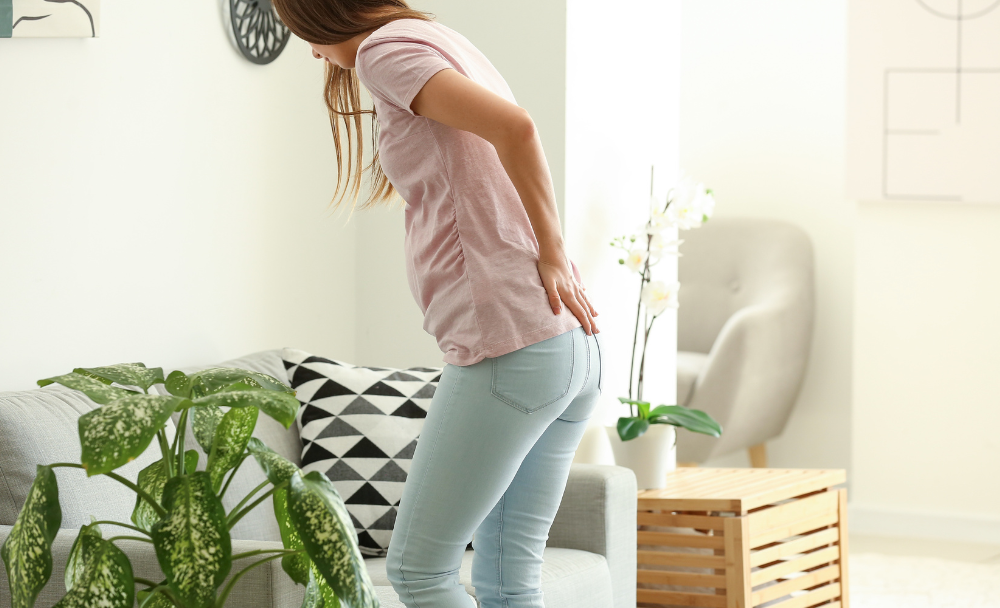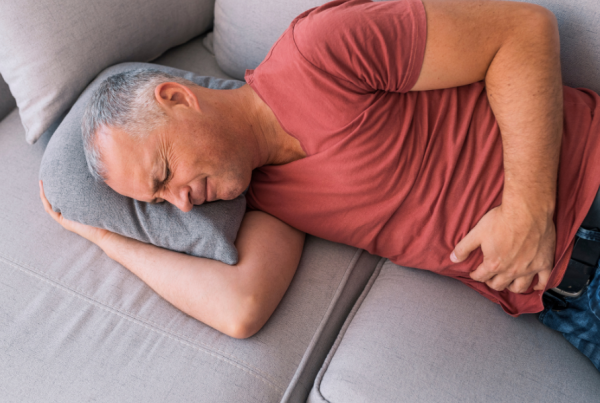Hemorrhoids
Move Better. Live Fuller. Your Wellness Journey Starts Here.
Schedule a FREE Discovery Call!
What Are Hemorrhoids?
Hemorrhoids are veins that have become swollen, enlarged, or irritated around the anus or in the lower internal portion of the rectum.
Everyone has these veins, but for a variety of reasons, they can become abnormally swollen and create uncomfortable symptoms. The cause of hemorrhoids can vary from person to person, although the symptoms are recognizable regardless of where the hemorrhoids originate.
Hemorrhoids are often referred to as external, internal, or prolapsed hemorrhoids depending on their location or circumstances. External hemorrhoids occur under the skin around the anus, whereas internal hemorrhoids occur inside the anus. Prolapsed hemorrhoids occur in the rectum, but extend or bulge out of the anus.

Each type of hemorrhoid can cause similar symptoms:
- Bleeding
- Pressure
- Irritation
- Itching
- General discomfort
- Discomfort with bowel movements
- In some cases, pain
What Causes Hemorrhoids?
There are many causes of hemorrhoids—many of which are avoidable. The different causes are explained below, so you can better understand some possible factors for your condition!
Natural Causes
- Aging: Hemorrhoids are more likely to develop with age, as the tissues of the rectum and anus become thinner and weaker over time.
- Genetics: Some people are more likely to develop hemorrhoids than others due to genetic factors.
Causes From Behavioral Habits or Other Scenarios
- Straining during bowel movements: Excessive straining puts pressure on the veins of the rectal and anal area, which can cause hemorrhoids.
- Sitting too long on the toilet: Similarly to straining, sitting on the toilet for a long time puts excessive pressure on the veins of the rectum and anus.
- Frequent constipation or diarrhea: Both of these conditions can lead to one or both of the above two situations.
- Pelvic floor dysfunction: Having uncoordinated pelvic floor muscles can lead to more difficult bowel movements, straining, and constipation—which can lead to hemorrhoids.
- Anal intercourse: Although this may not be a direct cause, it can further irritate and worsen any current symptoms of hemorrhoids. Therefore, it may be best to avoid this form of intercourse until the symptoms are no longer present.
- Heavy lifting: Improper posture and form during heavy lifting can put a lot of pressure and strain on the lower body, including the pelvic floor and muscles of the rectum/anus.
- Pregnancy and vaginal delivery: Pregnancy can create extra pressure on the pelvic floor and rectal/anal areas, increasing the chance of hemorrhoids. Similarly, many people may experience hemorrhoids after a vaginal delivery, due to the straining from labor.
As you can see, many of the causes of hemorrhoids are behaviors that can be modified to help prevent future complications. However, that can be easier said than done.
Don’t worry! All of these complications can be supported, managed, or even treated with the help of pelvic floor physical therapy—including those who experience frequent constipation or diarrhea, who have pelvic floor dysfunction, who perform a lot of heavy lifting, or who are pregnant. Although age and genetics are not necessarily something you can change, pelvic floor therapy can make the symptoms of hemorrhoids more manageable, even in those cases!
Physical Therapy for Hemorrhoids
Although experiencing hemorrhoids on occasion is not typically a condition that people think they need to see a doctor for, it can still be beneficial to meet with a professional. They can talk you through your symptoms and determine the best course of treatment depending on the severity of your condition.
In very mild cases, this can include things like recommending lifestyle changes and prescribing over-the-counter solutions or medications to help alleviate your symptoms. In other cases, they may perform minimally invasive procedures to alleviate the issue. It is also essential to consider lifestyle changes such as diet. Lack of fiber in your diet, as well as inadequate daily hydration, can make bowel movements more difficult, thereby resulting in straining, constipation, and longer toilet sessions.
Additionally, it can be incredibly beneficial to see a physical therapist—especially for individuals who are more predisposed to experiencing hemorrhoids frequently. Hemorrhoids or symptoms of pelvic floor dysfunction are manageable and treatable, and shouldn’t be something that you just “live with.” Ignoring symptoms for too long can cause worsening of the condition, so it is important to be proactive with your health.
Seeing a physical therapist is a great way to be proactive with your health and help reverse bad habits that can be a cause of hemorrhoids. Many of the causes of hemorrhoids are avoidable behaviors that can be better addressed with pelvic floor physical therapy! Bathroom habits, posture, and better pelvic floor muscle control are just some of the things that can be re-learned and managed with the help of a professional. In the cases of pregnancy, lifting, and other situations, a pelvic floor therapist can help you better understand and gain control over your pelvic floor muscles; helping you perform tasks with better safety and efficiency.
At Hive Therapy and Wellness, some treatments we utilize to help treat and better manage hemorrhoids include:
- Behavioral modifications
- Therapeutic modalities
- Therapeutic activities
- Manual therapy
- Neuromuscular re-education
- Biofeedback
- Exercise prescription
Hemorrhoids are veins that have become swollen, enlarged, or irritated around the anus or in the lower internal portion of the rectum.
Everyone has these veins, but for a variety of reasons, they can become abnormally swollen and create uncomfortable symptoms.
The cause of hemorrhoids can vary from person to person, although the symptoms are recognizable regardless of where the hemorrhoids originate.
Hemorrhoids are often referred to as external, internal, or prolapsed hemorrhoids depending on their location or circumstances.
External hemorrhoids occur under the skin around the anus, whereas internal hemorrhoids occur inside the anus. Prolapsed hemorrhoids occur in the rectum, but extend or bulge out of the anus. Each type of hemorrhoid can cause similar symptoms:
- Bleeding
- Pressure
- Irritation
- Itching
- General discomfort
- Discomfort with bowel movements
- In some cases, pain
There are many causes of hemorrhoids—many of which are avoidable. The different causes are explained below, so you can better understand some possible factors for your condition!
Natural Causes
Aging: Hemorrhoids are more likely to develop with age, as the tissues of the rectum and anus become thinner and weaker over time.
Genetics: Some people are more likely to develop hemorrhoids than others due to genetic factors.
Causes From Behavioral Habits or Other Scenarios
Straining during bowel movements: Excessive straining puts pressure on the veins of the rectal and anal area, which can cause hemorrhoids.
Sitting too long on the toilet: Similarly to straining, sitting on the toilet for a long time puts excessive pressure on the veins of the rectum and anus.
Frequent constipation or diarrhea: Both of these conditions can lead to one or both of the above two situations.
Pelvic floor dysfunction: Having uncoordinated pelvic floor muscles can lead to more difficult bowel movements, straining, and constipation—which can lead to hemorrhoids.
Anal intercourse: Although this may not be a direct cause, it can further irritate and worsen any current symptoms of hemorrhoids. Therefore, it may be best to avoid this form of intercourse until the symptoms are no longer present.
Heavy lifting: Improper posture and form during heavy lifting can put a lot of pressure and strain on the lower body, including the pelvic floor and muscles of the rectum/anus.
Pregnancy and vaginal delivery: Pregnancy can create extra pressure on the pelvic floor and rectal/anal areas, increasing the chance of hemorrhoids. Similarly, many people may experience hemorrhoids after a vaginal delivery, due to the straining from labor.
As you can see, many of the causes of hemorrhoids are behaviors that can be modified to help prevent future complications. However, that can be easier said than done.
Don’t worry! All of these complications can be supported, managed, or even treated with the help of pelvic floor physical therapy—including those who experience frequent constipation or diarrhea, who have pelvic floor dysfunction, who perform a lot of heavy lifting, or who are pregnant.
Although age and genetics are not necessarily something you can change, pelvic floor therapy can make the symptoms of hemorrhoids more manageable, even in those cases!
Although experiencing hemorrhoids on occasion is not typically a condition that people think they need to see a doctor for, it can still be beneficial to meet with a professional.
They can talk you through your symptoms and determine the best course of treatment depending on the severity of your condition.
In very mild cases, this can include things like recommending lifestyle changes and prescribing over-the-counter solutions or medications to help alleviate your symptoms.
In other cases, they may perform minimally invasive procedures to alleviate the issue.
It is also essential to consider lifestyle changes such as diet. Lack of fiber in your diet, as well as inadequate daily hydration, can make bowel movements more difficult, thereby resulting in straining, constipation, and longer toilet sessions.
Additionally, it can be incredibly beneficial to see a physical therapist—especially for individuals who are more predisposed to experiencing hemorrhoids frequently.
Hemorrhoids or symptoms of pelvic floor dysfunction are manageable and treatable, and shouldn’t be something that you just “live with.”
Ignoring symptoms for too long can cause worsening of the condition, so it is important to be proactive with your health.
Seeing a physical therapist is a great way to be proactive with your health and help reverse bad habits that can be a cause of hemorrhoids.
Many of the causes of hemorrhoids are avoidable behaviors that can be better addressed with pelvic floor physical therapy!
Bathroom habits, posture, and better pelvic floor muscle control are just some of the things that can be re-learned and managed with the help of a professional.
In the cases of pregnancy, lifting, and other situations, a pelvic floor therapist can help you better understand and gain control over your pelvic floor muscles; helping you perform tasks with better safety and efficiency.
At Hive Therapy and Wellness, some treatments we utilize to help treat and better manage hemorrhoids include:
- Behavioral modifications
- Therapeutic modalities
- Therapeutic activities
- Manual therapy
- Neuromuscular re-education
- Biofeedback
- Exercise prescription
You can learn more about these treatments on our Treatments Page.





